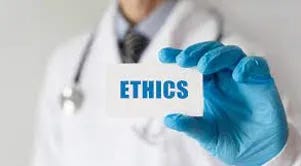"...the primary duty of care of the doctor is to the individual patient in front of them…"
"…acting in their best interest and considering their physical, emotional and philosophical /spiritual needs and wishes at all times."
A group of doctors in the UK has prepared an important paper considering informed consent.
The paper is Medical Ethics and Facilitating Fully Informed Consent to Treatment, authored by Alan Mordue, Liz Evans, James Royle and Clare Craig.
The preprint paper is accessible via this link: https://osf.io/preprints/osf/7b64n
Mordue et al say (emphasis added):
During the Covid-19 era, it has become increasingly apparent to some medical professionals that we are experiencing a crisis in medical ethics across the Western medical world.
They argue that we have witnessed a dangerous erosion of the core ethical principles that underpin civilised society, through the implementation of misguided and unethical Covid-19 policies by Governments and Public Health bodies .
Well-established medical and public health principles have been discarded, such as: the requirement for robust evidence; adhering to the precautionary principle in order to minimise risk; careful consideration of harms as well as benefits; fully informed consent to treatment and adherence to due legal process; and the provision of accurate information to the public in a way that avoids undue alarm.
Most importantly, Mordue et al acknowledge:
…the primary duty of care of the doctor is to the individual patient in front of them, acting in their best interest and considering their physical, emotional and philosophical/spiritual needs and wishes at all times.
But in whose best interest is the doctor working now?
The medical profession appears to have been conscripted by governments working in the best interests of the pharmaceutical industry.
Doctors and other medical professionals are subject to punishment by captured regulatory bodies such as the GMC in the UK, and Ahpra in Australia, if they question prescriptive medical ‘guidelines’ - e.g. vaccination ‘recommendations’ which have morphed into mandates in countries such as the UK, Australia, the United States, Canada, New Zealand, and elsewhere.
Mordue et al ask “How can we move forward?” and say (emphasis added):
There is an urgent need for a doctor-driven return to ethical, patient-centred care, which is safeguarded against corruption by the vested interests of the pharmaceutical industry and political influences.
This is eloquently articulated in this paper (January 2023) which analyses the UK Health Security Agency (UKHSA) data indicating that the Covid-19 vaccines may have paradoxically increased, rather than decreased, overall mortality rates. The authors conclude:
“The modern medical system of many westernized countries has forsaken its ethical center, which is best summarized by the ancient Latin dictum of Primum Non Nocere, “First, Do No Harm”.
The only way for medical doctors to reclaim the ethos of their once noble profession, and to do so with grace and respect, is to stop acquiescing to corrupt federal agencies and pharmaceutical influence, to take medicine back into their own hands.”
Mordue et al conclude:
The end of the pandemic and the lessons learned from mistakes made, provide a great opportunity for the medical profession to comprehensively reject the move to technocratic medicine, and the resulting medical tyranny imposed by well meaning but misguided organisations and health officials, and to put Hippocratic medical ethics back at the heart of the practice of medicine.
What are medical journals doing to prioritise discussion on the fundamental moral and ethical principle in medicine - informed consent?
Little or nothing it seems… Mordue et al have approached several high profile journals with their paper, but so far it has been rejected. How can the journals reject this vitally important paper? Who exactly is pulling their strings?
In regard to the journal industry, I’ve been writing to The BMJ for years, see links to my BMJ rapid responses here, published during the Fiona Godlee era. In recent years, ‘Covid’ times, I’ve written to current editor Kamran Abbasi, pleading for The BMJ to address the destruction of voluntary informed consent for vaccination, but my pleas have fallen upon deaf ears. See for example: Health practitioners, Covid jabs and 'valid informed consent' - a medical ethics disaster.
The medical profession must step up and claim the moral authority to act in the best interest of patients, and reify informed consent, rejecting any interference which deflects them from their duty.
Recently orthopaedic surgeon Ian McDermott raised the Mordue et al informed consent paper on Ahmad Malik’s Honest Health podcast, see from 44:20: https://docmalik.com/218-two-peas-in-a-orthopod/
It was so refreshing to hear two doctors having a candid discussion about the state of medicine and informed consent.
This is an excellent discussion, running for two and a half hours, including good-natured banter. This is a rare opportunity - frank discussion between two doctors, one of whom, Ahmad Malik, has been cancelled out of his profession for challenging the narrative. Highly recommend listening to this informative podcast.
Please consider and help share Mordue et al’s important paper: Medical Ethics and Facilitating Fully Informed Consent to Treatment: https://osf.io/preprints/osf/7b64n







Excellent article, Elizabeth! The decline in both mortality and ethical behavior among those in positions of trust is truly devastating. Politicians, medical and scientific professionals, police, journalists, the judiciary, and leaders in both the public and business sectors are largely complicit in this severe erosion of moral standards. While there are still principled individuals within these ranks, they are unfortunately too few to reverse the downward trend. Informed consent is the crucial difference between living in a free, open society and being reduced to a subject of slavery
Doctors have never been good in the US. You might find a random doc that uses critical thinking and a questioning attitude applied to their patient’s best interest.
But to the vast majority the medical profession is about obtaining and maintaining a wealthy lifestyle.